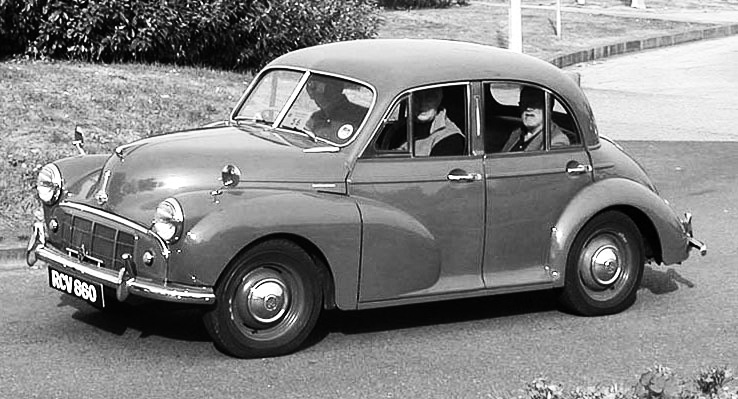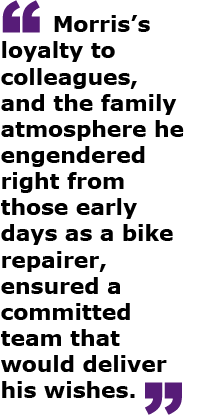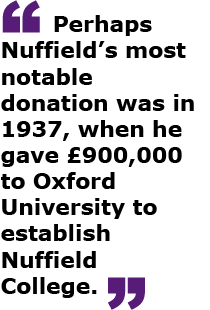Business heroes: William Morris, 1st Viscount Nuffield, founder of Morris Motors, philanthropist
The road to success
 Morris Motors was at the forefront of the UK’s automotive sector for much of the twentieth century. But while the Morris badge no longer survives, its founder’s name lives on thanks to his many acts of generosity
Morris Motors was at the forefront of the UK’s automotive sector for much of the twentieth century. But while the Morris badge no longer survives, its founder’s name lives on thanks to his many acts of generosity
By Tim Gibson
In 1892, William Morris opened a bicycle repair shop in his parents’ front room in Cowley St John, Oxford. Few would have predicted that he’d go on to become one of the UK’s most inspiring entrepreneurs. But within just eight years, Morris had expanded his business as well as designing and building a motorcycle. The first motorcar bearing his name appeared 13 years later.
 Such a meteoric rise sounds like it came easily when you read about it in the pages of Peter Hull’s brilliantly concise biography of Morris. But of course there were bumps along the way, including disagreements with early business partners, and failed ventures such as his attempt to run a colliery in the Forest of Dean in the late 1920s.
Such a meteoric rise sounds like it came easily when you read about it in the pages of Peter Hull’s brilliantly concise biography of Morris. But of course there were bumps along the way, including disagreements with early business partners, and failed ventures such as his attempt to run a colliery in the Forest of Dean in the late 1920s.
Morris’s success was hard earned. He worked long hours and expected similar dedication from his employees. Despite having a reputation for fairness, reports say he could be short-tempered with colleagues who didn’t see things his way.
For Morris, who became Sir William Morris in 1929 and was awarded a peerage in 1934, Morris Motors Ltd was his life. Its success defined him, not least because the cars his company produced carried his name upon their grille.
That did not make Morris, Lord Nuffield, unwilling to share the spoils of his success. Quite the contrary, in fact: in his lifetime, he gave away an estimated £30 million to a dizzying array of causes, many of which continue to thrive to this day.
In 1936, when Morris Motors was at the height of its success, Nuffield ring fenced £2.25 million in share reserves for his employees. They received a dividend on these shares, meaning the company’s success was also their success.
 Lord Nuffield’s generosity could be seen as an early version of employee ownership, where a company’s workforce has a stake in the business. For Nuffield, it was a matter of justice: the share stock was put aside for hourly paid workers, to top up their wages. Salaried staff, meanwhile, benefitted from a contributory pension scheme – something that was by no means common practice among industrialists in the early part of the last century.
Lord Nuffield’s generosity could be seen as an early version of employee ownership, where a company’s workforce has a stake in the business. For Nuffield, it was a matter of justice: the share stock was put aside for hourly paid workers, to top up their wages. Salaried staff, meanwhile, benefitted from a contributory pension scheme – something that was by no means common practice among industrialists in the early part of the last century.
Of course, Nuffield would have seen the business benefits of enabling his staff to share a dividend. Employees who have a stake in their company are more driven, because they see a direct link between their effort and the rewards they enjoy.
But Morris Motors didn’t want for dedicated staff: Morris’s loyalty to colleagues, and the family atmosphere he engendered right from those early days as a bike repairer, ensured a committed team that would deliver his wishes.
 In short, Lord Nuffield did not have to buy his employees’ goodwill. They gave it willingly. And his other acts of altruism suggest that the decision to give Morris Motors’ staff a stake in the company was driven by generosity rather than business savvy. Nuffield had already established a reputation as a generous benefactor, giving to a variety of causes.
In short, Lord Nuffield did not have to buy his employees’ goodwill. They gave it willingly. And his other acts of altruism suggest that the decision to give Morris Motors’ staff a stake in the company was driven by generosity rather than business savvy. Nuffield had already established a reputation as a generous benefactor, giving to a variety of causes.
In 1926, he donated £10,000 to the parents of children in borstals so they could afford regular visits. A further £10,000 went to establish The King Alfonso XIII Chair of Spanish Studies at Exeter College, Oxford University. Nuffield also gave to a variety of hospitals throughout the UK, including the Radcliffe Infirmary in Oxford, St Thomas’s in London and the Royal Devon and Exeter.
Perhaps Nuffield’s most notable donation was in 1937, when he gave £900,000 to Oxford University to establish Nuffield College. This is a postgraduate college specialising in the social sciences (Nuffield hoped it would focus on engineering, but it wasn’t to be). Not a bad legacy from a man who left school at 14 and was apprenticed as a bike mechanic.
 Nuffield set up his eponymous Foundation in 1943, with a remit to focus on healthcare and social wellbeing. He gave the foundation £10 million of share options in Morris Motors in order to secure its future.
Nuffield set up his eponymous Foundation in 1943, with a remit to focus on healthcare and social wellbeing. He gave the foundation £10 million of share options in Morris Motors in order to secure its future.
These acts of generosity established a template that subsequent generations of entrepreneurs would follow. Consider the Bill and Melinda Gates Foundation and the Michael and Susan Dell Foundation as cases in point. Along with his care for his own staff, they show Lord Nuffield’s deeply held desire to share the fruits of his success with others.
Although the Morris Motors badge is now the stuff of automotive history, Nuffield’s legacy is very much alive more than five decades after his death. Strange to think it all started with a bike shop in his parents’ front room…
Just Recruitment: Doing the right thing
Just Recruitment Group Ltd is one of the only employee-owned recruitment companies in the UK. As well as providing its workforce with ownership of the business, Just Recruitment supports a number of charitable causes. Among these are East Anglia’s Children’s Hospices (EACH) and Needham Market Football Club Under 11s. Like Lord Nuffield, we believe in sharing our prosperity, so that as many people as possible benefit from our success.
© Copyright Just Recruitment 2019
If you liked this article you may like to read – Business heroes: Ove Arup, Structural Engineer – Shaping the world
You may also like to read – How to find your passion

